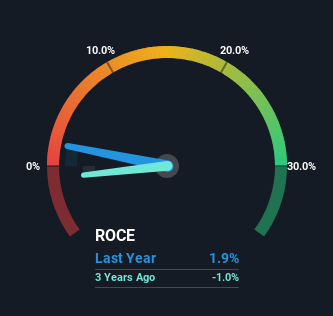- Singapore
- /
- Hospitality
- /
- SGX:M04
Mandarin Oriental International (SGX:M04) Is Reinvesting At Lower Rates Of Return

If you're looking for a multi-bagger, there's a few things to keep an eye out for. In a perfect world, we'd like to see a company investing more capital into its business and ideally the returns earned from that capital are also increasing. Put simply, these types of businesses are compounding machines, meaning they are continually reinvesting their earnings at ever-higher rates of return. Having said that, from a first glance at Mandarin Oriental International (SGX:M04) we aren't jumping out of our chairs at how returns are trending, but let's have a deeper look.
What Is Return On Capital Employed (ROCE)?
For those who don't know, ROCE is a measure of a company's yearly pre-tax profit (its return), relative to the capital employed in the business. The formula for this calculation on Mandarin Oriental International is:
Return on Capital Employed = Earnings Before Interest and Tax (EBIT) ÷ (Total Assets - Current Liabilities)
0.019 = US$65m ÷ (US$4.2b - US$759m) (Based on the trailing twelve months to June 2023).
So, Mandarin Oriental International has an ROCE of 1.9%. In absolute terms, that's a low return and it also under-performs the Hospitality industry average of 3.9%.
See our latest analysis for Mandarin Oriental International

Historical performance is a great place to start when researching a stock so above you can see the gauge for Mandarin Oriental International's ROCE against it's prior returns. If you want to delve into the historical earnings , check out these free graphs detailing revenue and cash flow performance of Mandarin Oriental International.
What The Trend Of ROCE Can Tell Us
In terms of Mandarin Oriental International's historical ROCE movements, the trend isn't fantastic. Over the last five years, returns on capital have decreased to 1.9% from 4.5% five years ago. Although, given both revenue and the amount of assets employed in the business have increased, it could suggest the company is investing in growth, and the extra capital has led to a short-term reduction in ROCE. And if the increased capital generates additional returns, the business, and thus shareholders, will benefit in the long run.
Our Take On Mandarin Oriental International's ROCE
While returns have fallen for Mandarin Oriental International in recent times, we're encouraged to see that sales are growing and that the business is reinvesting in its operations. These growth trends haven't led to growth returns though, since the stock has fallen 24% over the last five years. As a result, we'd recommend researching this stock further to uncover what other fundamentals of the business can show us.
Since virtually every company faces some risks, it's worth knowing what they are, and we've spotted 2 warning signs for Mandarin Oriental International (of which 1 is significant!) that you should know about.
While Mandarin Oriental International isn't earning the highest return, check out this free list of companies that are earning high returns on equity with solid balance sheets.
New: Manage All Your Stock Portfolios in One Place
We've created the ultimate portfolio companion for stock investors, and it's free.
• Connect an unlimited number of Portfolios and see your total in one currency
• Be alerted to new Warning Signs or Risks via email or mobile
• Track the Fair Value of your stocks
Have feedback on this article? Concerned about the content? Get in touch with us directly. Alternatively, email editorial-team (at) simplywallst.com.
This article by Simply Wall St is general in nature. We provide commentary based on historical data and analyst forecasts only using an unbiased methodology and our articles are not intended to be financial advice. It does not constitute a recommendation to buy or sell any stock, and does not take account of your objectives, or your financial situation. We aim to bring you long-term focused analysis driven by fundamental data. Note that our analysis may not factor in the latest price-sensitive company announcements or qualitative material. Simply Wall St has no position in any stocks mentioned.
About SGX:M04
Mandarin Oriental International
Engages in the ownership and operation of hotels, resorts, and residences in Asia, Europe, the Middle East, Africa, and the Americas.
Excellent balance sheet unattractive dividend payer.


